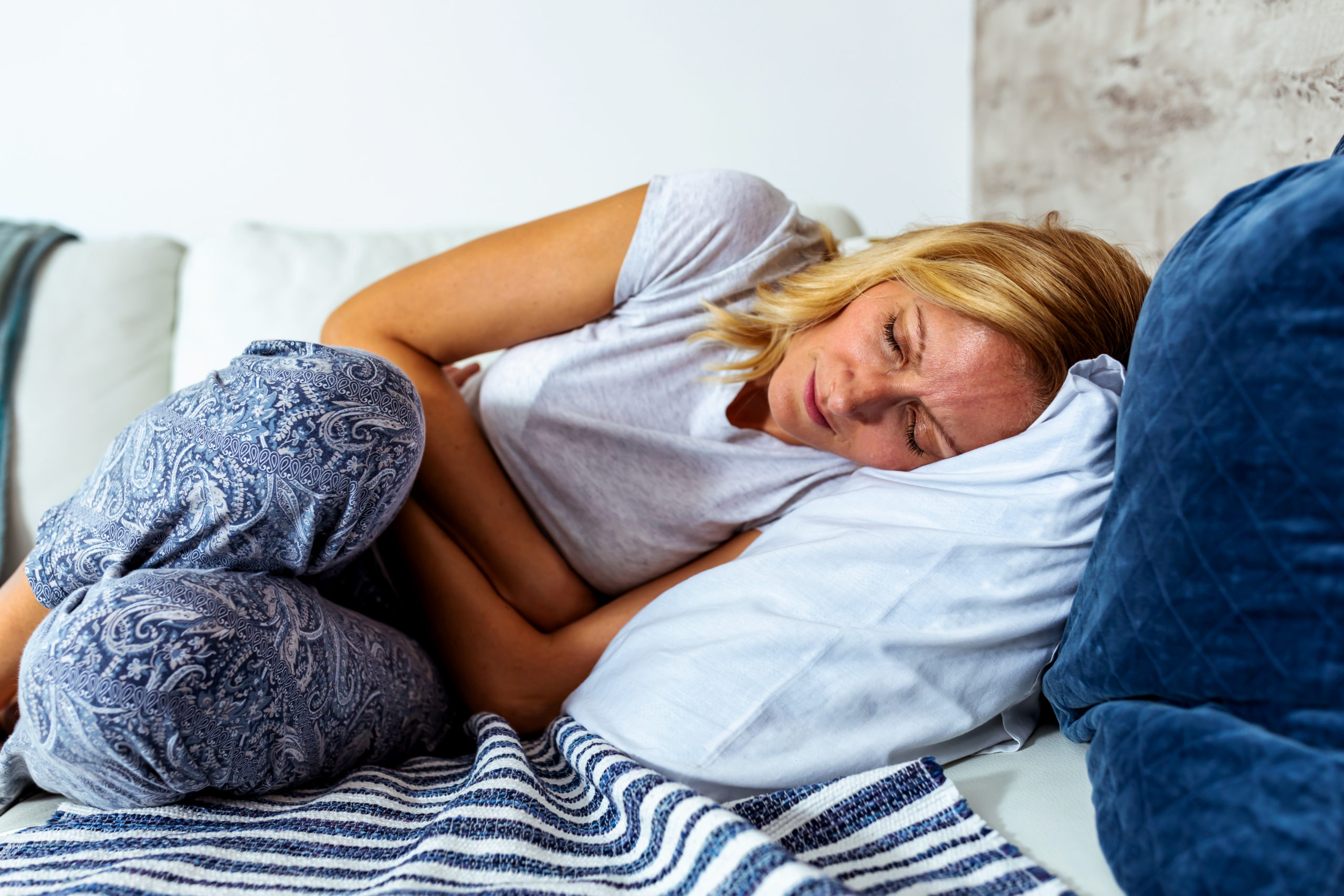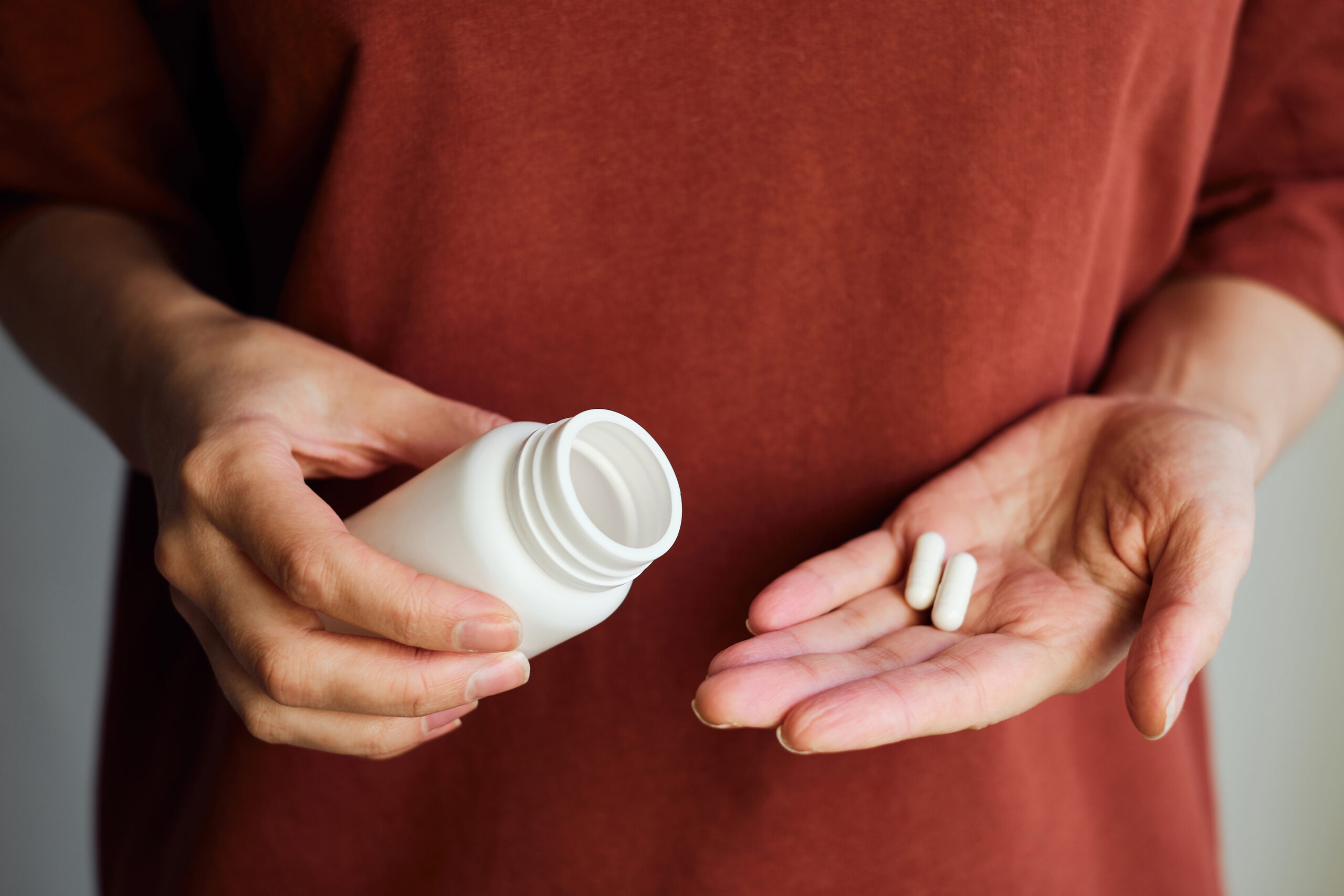There’s never a good time to feel constipated. But during menopause, when you’re already dealing with frustrations like hot flashes, low libido, and brain fog, constipation can become the aggravator that completely derails your day.
Researchers define constipation as the infrequent passage of stools or difficulty getting rid of stools. You have less than three bowel movements every week, and those that you do have can be hard or painful to excrete.
Constipation might also entail straining when you’re having a bowel movement, not being able to fully excrete stool, abdominal discomfort, and bloating.1
Why is constipation more common during menopause? The short answer involves shifting hormones, particularly estrogen.
“Estrogen is a main culprit in constipation, especially when it comes to the decline in estrogen levels during menopause,” says Bindiya Gandhi, MD, in this mindbodygreen blog.
Among estrogen’s many roles, it helps support mobility along the digestive tract.2 When estrogen slows down during menopause, so can your ability to have regular bowel movements.
Dropping estrogen levels can also adversely impact the trillions of bacteria that inhabit your gut, making issues like constipation more common. Conversely, dysbiosis can impact estrogen and other hormones.3
Learn more about dysbiosis in this blog.
Declining estrogen levels can mean that your stress hormone cortisol stays elevated when it shouldn’t be.4 An increased stress response creates additional havoc, including insomnia and other sleep issues, which can become especially pronounced around menopause.5
A vicious cycle ensues. When you’re not sleeping well and dealing with constipation, you’ve got more stress. That added stress exacerbates menopausal symptoms such as hot flashes. Worsening the potential for constipation are your pelvic floor muscles, which can become weak around menopause and make bowel movements more difficult.6
Drops in other hormones, including progesterone, around menopause also play a role in constipation. Couple that with triggers like medications you may be taking and insufficient dietary fiber, and you’ve got a formula for frustrating bathroom woes.
The good news is that constipation isn’t inevitable during menopause—with these 10 helpful strategies.
Strategy #1: Get More Fiber
When it comes to fighting constipation, dietary fiber goes to the head of the class. One meta-analysis concluded that dietary fiber could increase stool frequency in people with constipation.7
Fiber does so many other awesome things too, like crushing cravings and balancing blood-sugar levels.
You’ll want to get 50 grams daily, but don’t do that all at once. Instead, gradually increase your fiber intake by five grams every few days until you hit the mark, and make sure you’re getting sufficient water to match that increase.
Learn my 15 favorite high-fiber foods in this blog.
Extra Fiber provides 12 types of fiber, including a prebiotic that supports the growth of friendly bacteria.* This is the Rolls Royce of fiber products… and you can only get it here.
Strategy #2: Get Sufficient Water
Research shows that even mild dehydration can increase the risk of constipation.8 Being dehydrated can also elevate cortisol levels, making you more stressed.9
The simple solution is to keep a BPA-free canteen nearby, filled with clean and filtered water, and sip liberally throughout the day. The only time I don’t want you drinking too much water is during meals, when it can inhibit stomach enzymes that break down protein. Find out how much water you need with this handy gadget.
Green tea, which is loaded with antioxidants to fight the oxidative stress and inflammation associated with so many menopause symptoms, is another favorite way to stay hydrated.
This Peach & Mint Iced Green Tea recipe keeps you hydrated and satisfied!
Strategy #3: Move Your Body to Move Your Bowels
Among its benefits, regular exercise improves transit time for food to move through your large intestine.10 In other words, you have more frequent bowel movements when you move more! One review found that any kind of physical movement, including Qigong and walking, could improve constipation.11
An intense, full-body workout in just eight minutes? Yes, please! Learn more in this blog.
Strategy #4: Get Quality Sleep
Studies show that poor sleep can increase the risk of constipation.12 This can be especially problematic around menopause, when sleep problems like insomnia become more common.
Remedy that by aiming for eight or nine hours of solid, uninterrupted sleep every single night. I talk more about sleep problems during menopause and how to fix them in this blog.
My Best Rest Sleep Cheat Sheet provides my top tips to get consistently great sleep every single night. Claim yours for free here.
Strategy #5: Manage Stress
It’s not your imagination if you find that you’re constipated more often when you’re stressed out.
“Stress can upset your gut and make you tense your muscles,” says Susan Bernstein in this article. “That can make your constipation worse. And your brain is on high alert during times of stress, so you’re more aware of belly upset.”
Managing stress is a must to conquer constipation and the other obstacles that menopause throws your way. Whether that means yoga, meditation, deep breathing, or walking your chihuahua around the block, find a de-stressor that works for you and do it regularly!
Take Ten Stress Support is a uniquely formulated product that provides gamma-aminobutyric acid (GABA), a key neurotransmitter for a normal, calm stress response. We’ve also added other calming nutrients including glycine, niacinamide, pantothenic acid, and vitamin B6.* You can only order Take Ten Stress Support here.
Strategy #6: Get the Relaxation Mineral
Magnesium does so many great things, including promoting relaxation so you can get deeper, more restorative sleep. (That’s why I included Magnesium Body Calm along with Sleep Candy™ in my Sleep Support Bundle.) This mineral, which many of us are deficient in, can also help get things moving “down there.”*
“A terrific ‘cure’ for constipation is magnesium,” says Jonny Bowden, Ph.D., in Living Low Carb. “Get the magnesium citrate form, start with 400 milligrams a day for a few days, and then, if needed, increase to 800 milligrams. That almost always does it.”
Mark Hyman, MD, agrees.
“Extra magnesium citrate, vitamin C, and fiber (such as ground flaxseeds, with eight glasses of water a day) will cure most constipation,” he says in The Blood Sugar Solution.
Strategy #7: Love Your Gut
“As we age, our gut becomes challenged, and the healthy ratio of good bacteria to bad bacteria is imperiled,” says Anna Cabeca, DO, in MenuPause. “The immediate consequences are gas, bloating, acid reflux, constipation, and diarrhea.”
Constipation can be a sign of leaky gut, where your intestinal wall becomes compromised and things not intended to slip through do, creating havoc including an immune response.
When you’re constipated and have leaky gut, toxins that should be eliminated instead stay in your gut, where they can disrupt the trillions of bacteria in your gut and exacerbate dysbiosis. I talk more about leaky gut along with the best gut-healing foods and nutrients to fight it in The Virgin Diet. Order your copy here.
Strategy #8: Take a Probiotic
“Studies show that taking a daily probiotic helps improve constipation by improving consistency, transit time, and stool caliber,” says Gandhi in this mindbodygreen blog. “Probiotics also help improve estrogen levels by helping you stay regular, eliminating any estrogen or thyroid disturbers.”
Studies support these findings. One found that probiotics help improve gut transit time, stool frequency, and stool consistency.13 The key is to find a probiotic supplement with trillions of supporting organisms that also survive obstacles like your harsh stomach environment before it reaches your large intestine.
Read more about what to look for in a probiotic supplement here.
Strategy #9: Check Your Thyroid
“Thyroid hormones control peristalsis, or the movement of the intestines,” says Alan Christianson, NMD in The Thyroid Reset Diet. “Without the correct amount of hormones, gas, bloating, constipation, or diarrhea can be the result.”
If you suspect thyroid issues, ask your healthcare practitioner to do a complete thyroid panel, which measures TSH but also free T3 and T4, reverse T3, and antibodies. You can order a convenient at-home advanced thyroid panel and other lab tests here.
I speak with Dr. Christianson about thyroid health in this episode of Ask the Health Expert.
Strategy #10: Take Digestive Enzymes
Our body’s digestive enzymes (especially our stomach’s hydrochloric acid secretion) slow down by the time we’re in our 30s, which means we have more problems breaking down protein. Stress can further impact the quality and quantity of your digestive enzymes.
A digestive enzyme supplement can provide that needed support to help break down food, which may improve motility through the gut and relieve bathroom issues such as constipation.
Protein First Enzymes is a comprehensive digestive enzyme formula that combines enzymes with select botanicals to help you break down carbohydrates, fat, and protein like a pro.* Order it here.
The views in this blog by JJ Virgin should never be used as a substitute for professional medical advice. Please work with a healthcare practitioner concerning any medical problem or concern. The information here is not intended to diagnose, treat, or prevent any disease or condition. Statements contained here have not been evaluated by the Food and Drug Administration.
*These statements have not been evaluated by the Food and Drug Administration. This product is not intended to diagnose, treat, cure, or prevent any disease.
References:
- Jani B, Marsicano E. Constipation: Evaluation and Management. Mo Med. 2018 May-Jun;115(3):236-240. PMID: 30228729; PMCID: PMC6140151.
- Al-Shboul OA, Nazzal MS, Mustafa AG, Al-Dwairi AN, Alqudah MA, Abu Omar A, Alfaqih MA, Alsalem MI. Estrogen relaxes gastric muscle cells via a nitric oxide- and cyclic guanosine monophosphate-dependent mechanism: A sex-associated differential effect. Exp Ther Med. 2018 Sep;16(3):1685-1692. doi: 10.3892/etm.2018.6406. Epub 2018 Jul 4. PMID: 30186388; PMCID: PMC6122185.
- Baker JM, Al-Nakkash L, Herbst-Kralovetz MM. Estrogen-gut microbiome axis: Physiological and clinical implications. Maturitas. 2017 Sep;103:45-53. doi: 10.1016/j.maturitas.2017.06.025. Epub 2017 Jun 23. PMID: 28778332.
- Woods NF, Mitchell ES, Smith-Dijulio K. Cortisol levels during the menopausal transition and early postmenopause: observations from the Seattle Midlife Women’s Health Study. Menopause. 2009 Jul-Aug;16(4):708-18. doi: 10.1097/gme.0b013e318198d6b2. PMID: 19322116; PMCID: PMC2749064.
- Hirotsu C, Tufik S, Andersen ML. Interactions between sleep, stress, and metabolism: From physiological to pathological conditions. Sleep Sci. 2015 Nov;8(3):143-52. doi: 10.1016/j.slsci.2015.09.002. Epub 2015 Sep 28. PMID: 26779321; PMCID: PMC4688585.
- Neels H, Tjalma WA, Wyndaele JJ, De Wachter S, Wyndaele M, Vermandel A. Knowledge of the pelvic floor in menopausal women and in peripartum women. J Phys Ther Sci. 2016 Nov;28(11):3020-3029. doi: 10.1589/jpts.28.3020. Epub 2016 Nov 29. PMID: 27942113; PMCID: PMC5140793.
- Yang J, Wang HP, Zhou L, Xu CF. Effect of dietary fiber on constipation: a meta analysis. World J Gastroenterol. 2012 Dec 28;18(48):7378-83. doi: 10.3748/wjg.v18.i48.7378. PMID: 23326148; PMCID: PMC3544045.
- Arnaud MJ. Mild dehydration: a risk factor of constipation? Eur J Clin Nutr. 2003 Dec;57 Suppl 2:S88-95. doi: 10.1038/sj.ejcn.1601907. PMID: 14681719.
- Castro-Sepulveda M, Ramirez-Campillo R, Abad-Colil F, Monje C, Peñailillo L, Cancino J, Zbinden-Foncea H. Basal Mild Dehydration Increase Salivary Cortisol After a Friendly Match in Young Elite Soccer Players. Front Physiol. 2018 Sep 26;9:1347. doi: 10.3389/fphys.2018.01347. PMID: 30319450; PMCID: PMC6168646.
- Tantawy SA, Kamel DM, Abdelbasset WK, Elgohary HM. Effects of a proposed physical activity and diet control to manage constipation in middle-aged obese women. Diabetes Metab Syndr Obes. 2017 Dec 14;10:513-519. doi: 10.2147/DMSO.S140250. PMID: 29276399; PMCID: PMC5734236.
- Gao R, Tao Y, Zhou C, Li J, Wang X, Chen L, Li F, Guo L. Exercise therapy in patients with constipation: a systematic review and meta-analysis of randomized controlled trials. Scand J Gastroenterol. 2019 Feb;54(2):169-177. doi: 10.1080/00365521.2019.1568544. Epub 2019 Mar 7. PMID: 30843436.
- Gwee KA. Disturbed sleep and disturbed bowel functions: implications for constipation in healthy individuals. J Neurogastroenterol Motil. 2011 Apr;17(2):108-9. doi: 10.5056/jnm.2011.17.2.108. Epub 2011 Apr 27. PMID: 21602986; PMCID: PMC3093001.
- Dimidi E, Christodoulides S, Fragkos KC, Scott SM, Whelan K. The effect of probiotics on functional constipation in adults: a systematic review and meta-analysis of randomized controlled trials. Am J Clin Nutr. 2014 Oct;100(4):1075-84. doi: 10.3945/ajcn.114.089151. Epub 2014 Aug 6. PMID: 25099542.







